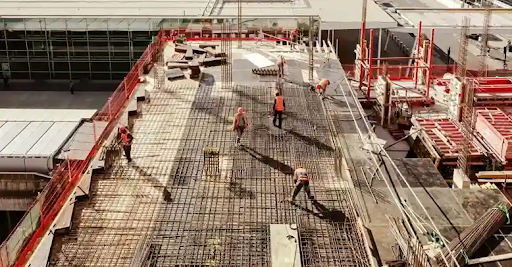Understanding different types of concrete and how to estimate them is essential for concrete contractors and building material suppliers. Concrete estimating services providers can help contractors in this regard. We will discuss them later in this article.
Types of Concrete Used in Commercial Projects
- Normal Strength Concrete
Normal strength concrete is most used type in commercial construction. It typically has a compressive strength of 20 to 40 MPa (megapascals). This type of concrete is ideal for structures that do not require high strength, such as sidewalks, driveways and foundations. It is made from a mixture of cement, water, sand and aggregates.
- High-Strength Concrete
High-strength concrete is designed for projects that require greater load-bearing capacity. With a compressive strength of over 40 MPa, this type of concrete is often used in high-rise buildings, bridges and other structures that need to support heavy loads. mix usually includes a lower water-to-cement ratio and may incorporate additives to enhance its strength.
- High-Performance Concrete
High-performance concrete goes beyond just strength. It is designed to withstand harsh environmental conditions, making it suitable for structures exposed to chemicals, extreme temperatures, or heavy traffic. This type of concrete often includes special additives and is used in applications like parking garages, industrial floors and marine structures.
- Lightweight Concrete
Lightweight concrete is made with lightweight aggregates, which reduce overall weight of concrete. This type is beneficial for projects where reducing load on structure is essential, such as in multi-story buildings or bridges. Lightweight concrete also has good thermal insulation properties, making it an energy-efficient choice.
- Self-Consolidating Concrete (SCC)
Self-consolidating concrete is a highly flowable type that can fill forms and around reinforcements without need for mechanical vibration. This makes it ideal for complex shapes and congested areas. SCC is often used in precast concrete elements, architectural structures and projects requiring a smooth finish.
- Reinforced Concrete
Reinforced concrete is a composite material that combines concrete with steel reinforcement bars (rebar) to improve its tensile strength. This type is widely used in commercial construction, especially for beams, columns and slabs. combination of concrete and steel allows for construction of durable and resilient structures.
How to Estimate Concrete for Commercial Projects
Estimating concrete quantities accurately is crucial for project success. Here are some steps to help you estimate concrete needs effectively:
- Determine Area
Start by measuring area where concrete will be poured. For slabs, multiply length by width. For walls, calculate height and width. Make sure to convert all measurements to same unit, such as feet or meters. - Calculate Volume
Once you have area, multiply it by thickness of concrete to find volume. For example, if you have a slab that is 10 feet long, 5 feet wide and 0.5 - Convert to Cubic Yards
Concrete is typically sold by cubic yard. To convert cubic feet to cubic yards, divide volume by 27 (since there are 27 cubic feet in a cubic yard). In our example, 25 cubic feet would be approximately 0.93 cubic yards. - Account for Waste
It’s essential to account for waste during estimation process. A good rule of thumb is to add 10% to your total volume to cover spillage, over-excavation, or other unforeseen issues. - Consult Concrete Estimating Services
For larger projects, it may be beneficial to consult professionals who specialize in construction estimating services. They can provide detailed estimates and help ensure that you have right amount of materials for your project. - Consider Local Suppliers
When estimating concrete needs, it’s also important to consider local building material suppliers. They can provide insights into types of concrete available and their costs, which can help you make informed decisions.
Final Thoughts
Understanding different types of concrete used in commercial projects and how to estimate them is crucial for success in construction industry. By knowing specific requirements of your project and accurately estimating quantities

